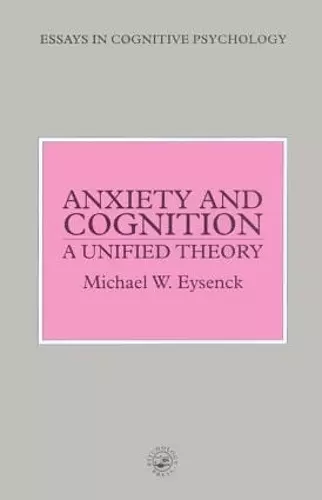Anxiety and Cognition
A Unified Theory
Format:Hardback
Publisher:Taylor & Francis Ltd
Published:14th May '97
Currently unavailable, and unfortunately no date known when it will be back
This hardback is available in another edition too:
- Paperback£51.99(9781138883017)

It is argued in this book that there are three major approaches to anxiety. First, there is anxiety as an emotional state. Second, there is trait anxiety as a dimension of personality. Third, there is anxiety as a set of anxiety disorders. What is attempted is to produce a unified theory of anxiety which integrates all these major approaches. According to this unified theory, there are four sources of information which influence the level of experienced anxiety: (1) experimental stimulation; (2) internal physiological activity; (3) internal cognitions, (e.g., worries); and (4) one's own behaviour. The unified theory is essentially based on a cognitive approach. More specifically, it is assumed that individual differences in experienced anxiety between those high and low in trait anxiety depend largely on cognitive biases. It is also assumed that the various anxiety disorders depend on cognitive biases, and that the main anxiety disorders differ in terms of the source of information most affected by such biases (e.g., social phobics have biased interpretation of their own behaviour). In sum, this book presents a general theory of anxiety from the cognitive perspective. It is intended that this theory will influence theory and research on emotion, personality, and the anxiety disorders.
This interesting monograph, written by one of the world's leading authorities on cognition and emotion, provides a persuasive synthesis of cutting edge research on the cognitive aspects of anxiety. In particular, Professor Eysenck's emphasis on the "repressor" processing style is likely to have a major impact on work in this area. Researchers in personality psychology and experimental psychopathology will surely benefit by reading this book. - Richard J. McNally (Harvard University)
I enjoyed reading this book - it was very interesting and written in a very clear and accessible style. It provides a careful review of a wide range of literature dealing with anxiety primarily from a cognitive perspective. The four factor theory provides a most useful framework for considering the complex and divergent literature on information processing biases in nonclinical and clinical anxiety, and on cognitive therapy for anxiety disorders. - Karin Mogg (University of Cambridge)
This book represents an admirable attempt to integrate experimental research on the cognitive aspects of anxiety with the clinical application of Cognitive Behavioural Therapy (CBT) to the treatment of anxiety disorders...An especially useful feature is the highlighting of some unique clinical problems that need to be addressed by cognitive models of anxiety...a very nice summary of experimental approaches to the clinical aspects of the main anxiety disorders. - Elaine Fox (University of Essex)
ISBN: 9780863774782
Dimensions: unknown
Weight: 540g
208 pages